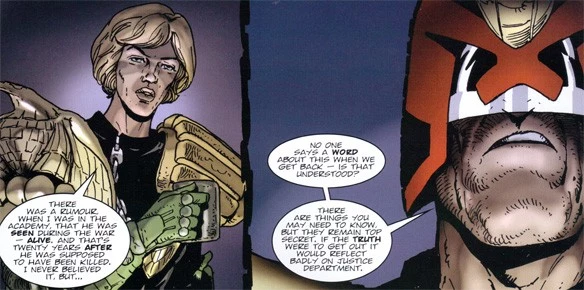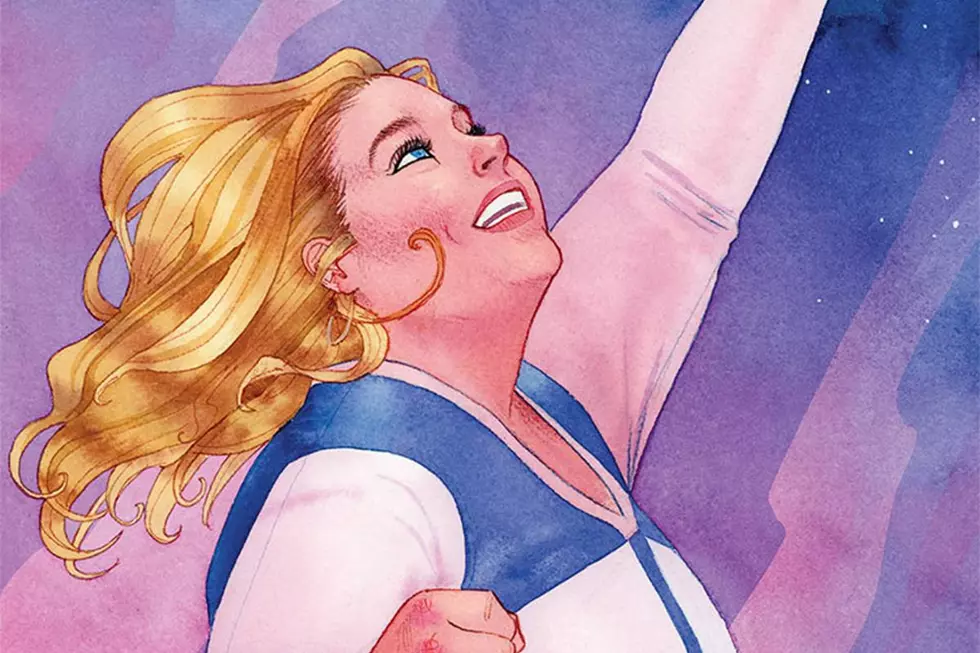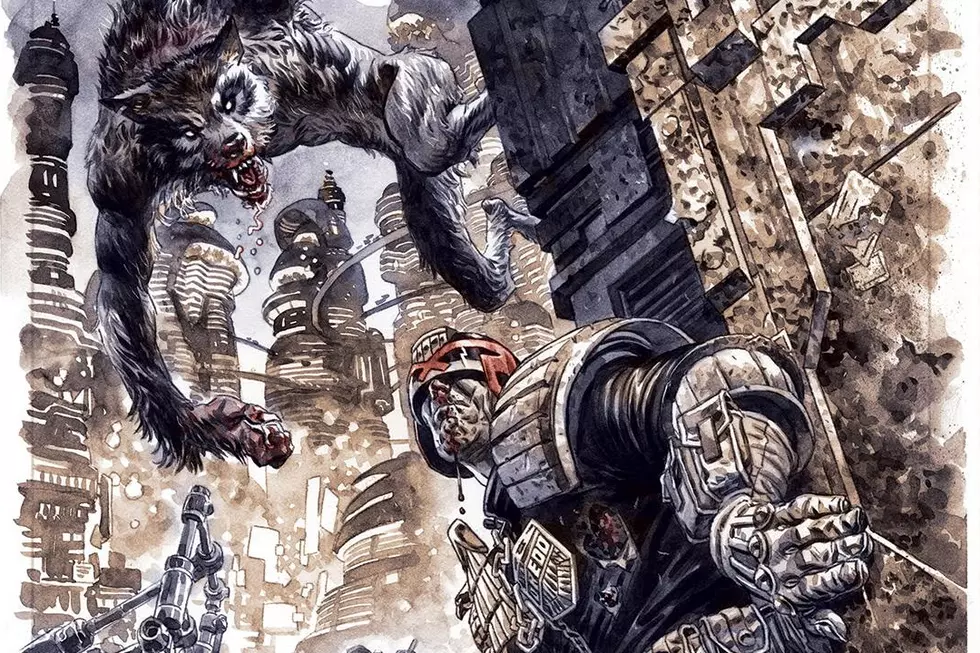
Buy This Book: ‘Judge Dredd: Origins’

I've been meaning to get more into Judge Dredd for a while now. I picked up a few of the classic stories back in October with the beautifully designed collections of The Dark Judges and The Cursed Earth, and I've read bits and pieces from the issues of 2000 AD that I come across, but to be honest, it can be difficult to figure out a place to really jump in.
But then, a copy of the new printing of John Wagner and Carlos Ezquerra's Origins showed up at my house courtesy of 2000 AD, and that seemed like a pretty good place to start. It was, and more than that, it's really good, full of great action, bizarre humor and a compelling look at this world. If you've been looking to start in on Dredd, this is the one to pick up. It's not really that I needed to read an origin story for Dredd -- he's not exactly a difficult character to get a handle on, even if the idea of the dystopian future ruled by fascists where the fascist thug is actually the good guy can lead to some pretty complicated stories. The thing is, Origins is a little more than what it says on the cover. There are certainly parts of it that read like Judge Dredd Year One, especially in the sections where an eleven-year-old Dredd is sent out on the streets for the first time to deal with the chaos following an apocalyptic nuclear war, but that's only a small piece of what's going on.
It's not really that I needed to read an origin story for Dredd -- he's not exactly a difficult character to get a handle on, even if the idea of the dystopian future ruled by fascists where the fascist thug is actually the good guy can lead to some pretty complicated stories. The thing is, Origins is a little more than what it says on the cover. There are certainly parts of it that read like Judge Dredd Year One, especially in the sections where an eleven-year-old Dredd is sent out on the streets for the first time to deal with the chaos following an apocalyptic nuclear war, but that's only a small piece of what's going on.
As the story unfolds, it sprawls out into an epic that doesn't just give an origin story for Dredd, but deals with the entire world around him, too. It goes from Mega-City One to the Cursed Earth -- the nuclear ravaged wasteland outside the City that occasionally takes the form of a radioactive wild west so that Dredd can have dystopian future adventures and sci-fi cowboy stories at the same time -- flashes back to the fall of America and the rise of the Judges, and ties it all together in a genuinely compelling story with great action, slapstick comedy and a thrilling mystery.
The overarching plot kicks off when a pair of mutants from the Cursed Earth infiltrate the City to deliver a mysterious package to the Grand Hall of Justice. The package contains a DNA sample from Judge Fargo, the man who founded the Judges, and from whom Dredd himself was cloned. There's a ransom note for the return of Fargo's body, which was thought to be entombed in the Hall of Justice, but which actually went missing long after the Judges faked Fargo's death to avoid the fallout from a scandal. Now, Dredd -- who very obviously has a personal stake in the matter -- and a small group of Judges have to cross the wasteland to recover his Father's body, if it's even really out there somewhere and not just an elaborate plot to get revenge. That's where it starts, and from there, Wagner starts to reveal the whole sordid backstory of Dredd's world, showing in detail how everything went wrong.
If it sounds complicated, that's because it is. It's a surprisingly continuity-heavy story, but that's not really a bad thing. This is, after all, a story that's entirely based on the sins of the past coming back to destroy you, and there's an intricate web of lies, betrayals and just plain bad decisions at the heart of it that needs to be unraveled. But because Wagner and Ezquerra have so much space to explore it -- Origins originally ran in 28 issues of 2000 AD, including a prologue drawn by Kev Walker -- and because they're able to build on 30 years of stories about their creation, nothing feels like an overwhelming info dump.

Instead, the mystery element of the story gives Dredd a good reason to go investigating Judge Fargo's past, and the conspiracies and coverups are necessary to explain. More than that, though, they pace the story in such a way that nothing's ever boring.
A lot of that just comes down to what the story's about -- Carlos Ezquerra drawing the literal nuclear destruction of the world isn't exactly a snooze to begin with -- but even the flashbacks are broken up with action in the present. There's never a moment in the story where Dredd's not in danger, even when he's taking a quiet moment to break down the details of how "Bad Bob" Booth, the last President, dragged the world into the apocalypse.
From the moment the Judges set foot in the Cursed Earth, they're attacked by raiders, then mutants, then a town of inbred, Fargo-worshipping "hickabillies" who want to string up Dredd for stealing their favorite son's face...

...then more raiders, and finally an ersatz Confederate Army of "mutants and outcasts" bent on destroying Mega-City One and reinstating a twisted, totalitarian version of America that would be even worse than the twisted, totalitarian version of America that they already have. And that's just what essentially amounts to a framing sequence.
It's an exciting, riveting comic, and there are so many great moments that it's hard to pick out highlights. I already mentioned the scenes where Dredd and Rico are sent out as rookie judges at the age of eleven -- younger, actually, since they were "born" at five, programmed in the cloning tanks with all the law knowledge they need -- but there's a pretty amazing bit before that where the Judges doing the cloning talk about Dredd's name. As it turns out, the actual, in-continuity reason that Dredd's name is "Dredd" is the same as it is here in the real world:

It sounds scary.
That bit cracked me up, and the idea that Wagner and Ezquerra are willing to have fun with explaining things that don't actually need explanations is another great thing about this story: It's really funny. Don't get me wrong, it's still pretty grim, full of nuclear annihilation and children gunning down looters in the streets and Dredd... well, Dredd being Dredd:

But it's not entirely dour. There are gags and puns and satire all over the place, weaved into the story in a way that complements the serious nature of the rest of the story.
It all comes together for a story that has everything I want out of a Judge Dredd comic. And what's more, it's kind of a turning point: With this, Wagner and Ezquerra finally solidified Dredd's world, and since then, Wagner's spent the last five years tearing it down. It's the sort of thing that makes me want to read more, and really, that's exactly what an origin needs to do.
More From ComicsAlliance
![Judge Dredd Takes On Fairlyhyperman In ‘The Cape & Cowl Crimes’ [Preview]](http://townsquare.media/site/622/files/2017/03/Dredd00.jpg?w=980&q=75)
![The Law Returns To The Moon In ‘Judge Dredd Annual 2017′ [Preview]](http://townsquare.media/site/622/files/2017/02/Dredd00.jpg?w=980&q=75)



![The Best Dark Horse Comics Covers of 2016 [Gallery]](http://townsquare.media/site/622/files/2017/01/featured.png?w=980&q=75)



